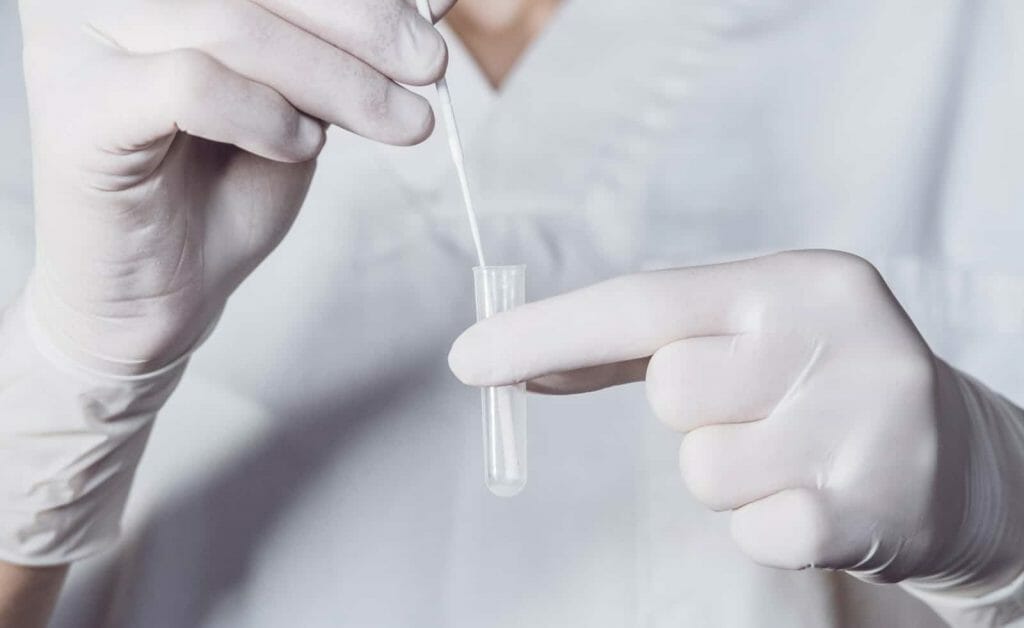Fertility Testing in Sydney
As you dream of building your family, we’re here to support your journey. Here at Fertility First, we provide in-depth fertility tests to evaluate your unique needs. Your fertility path is personal, and you might have already undergone tests by your GP or referring doctor – fantastic! In this scenario, your fertility specialist will analyse these results, potentially order more fertility tests, and discuss suitable treatment options.
If you haven’t had any fertility tests yet, don’t fret. Our fertility experts excel in fertility assessments and are ready to assist you.

Types of Female Fertility Testing
Female fertility testing comprises a series of medical evaluations and diagnostic procedures aimed at assessing a woman’s reproductive health and her ability to conceive. These tests encompass a range of assessments, including hormonal assessments, ultrasounds, and other specialised tests, to determine the quality and quantity of a woman’s eggs, the status of her reproductive organs, and her overall reproductive potential.
Female fertility testing plays a crucial role in understanding and addressing potential fertility issues, providing valuable insights for individuals and couples seeking to start or expand their families.
Pelvic Testing
Depending on the clients situation, the Doctors may also refer female patients on for a pelvic ultrasound.
Blood & Urine Testing
Blood and urine testing is taken to check for vitamin deficiencies, vaccination status and anything underlying that may affect conception or a healthy ongoing pregnancy.
Genetic Testing
We provide advanced scientific techniques for individuals at risk of hereditary conditions, enabling accurate testing for genetic disorders.
Egg Count Test (AMH)
A basic blood test that assesses the Anti-Mullerian Hormone (AMH) concentration in the bloodstream offers a reliable insight into a woman's ovarian reserve.
Tubal Patency Testing (HyCoSy) Testing
The HyCoSy test is a technique used by ultrasound to check if Fallopian tubes are open or blocked.
Ovulation Testing
An ovulation test, or ovulation predictor kit (OPK), helps women pinpoint their most fertile days by measuring the surge of luteinizing hormone (LH) in their urine.
Male Fertility Testing
When it comes to starting a family, many couples may find themselves navigating challenges along the way. Male fertility can play a significant role in this journey, as issues with sperm production or physical health can impact the ability to conceive. Studies show that about two-thirds of men with fertility concerns have some type of problem with sperm production. This can range from low sperm counts to the complete absence of sperm, as well as issues like poor motility or abnormal sperm shapes.
Understanding these issues is the first step in finding solutions. The good news is that male fertility testing is a relatively simple and non-invasive process, often serving as the first step when investigating male infertility. Typically, this involves a semen analysis, where a sample is evaluated to check for sperm count, motility, and morphology. This straightforward approach helps identify any potential issues and can guide couples toward the next steps in their journey.
Understanding male fertility issues can feel overwhelming, but seeking help is an important part of the process. By addressing these concerns early on, couples can take proactive steps toward improving their chances of conception. At Fertility First, we’re here to support you every step of the way, offering compassionate guidance and comprehensive assessments to help you navigate your path to parenthood.
Types of Male Fertility Testing
HBA Sperm Testing
Upon entering the female reproductive tract, the sperm will undergo a maturation process which will allow them to successfully fertilise the egg. Just like people who reach puberty at different times, so do sperm. If a sperm matures too early, it will not reach the egg and it will die before it has a chance to fertilise the egg.
The Hyaluronan Binding Assay (HBA test) will allow the andrology scientist to quantify the percentage of the sperm that can bind to this protein, revealing the percentage of a man’s sperm that is mature.
This test can help determine which treatment to apply to a patient. Binding scores that are low are generally recommended for ICSI in conjunction with a viscous medium that allows the embryologist to choose a sperm with normal functionality known as SpermSlow.
Halosperm Assay
Fertility First offers patients the option of the Halosperm assay which is used to assess the fertility potential of sperm by determining the percentage of sperm that contain fragmented and damaged DNA.
The Halosperm assay provides invaluable information about the quality of the DNA inside the sperm’s chromosomes and helps to provide clinical diagnosis and the management of male infertility.
When the Halosperm assay is performed in conjunction with a standard semen analysis, an overall picture can be obtained of the likelihood of the sperm being a factor in a couple’s fertility problems. A standard semen analysis is only useful for determining the transport aspects of sperm i.e. how many there are, how well they move and whether they are the correct shape.
The Halosperm assay provides invaluable information about the quality of the DNA inside the sperm and therefore what the sperm can do when it gets inside the egg.
Taking The Next Steps
At Fertility First, we recommend seeking medical advice from your GP or a specialist if you haven’t achieved pregnancy after 12 months of trying, or after just six months if you’re over 35.
There are circumstances where earlier fertility advice is prudent. These may include early menopause, polycystic ovaries, irregular or absent menstruation, a history of endometriosis, current or past cancer treatments for either partner, or a prior vasectomy for the male partner.
To consult one of our Fertility First specialists, both you and your partner will need a referral from your GP. Our compassionate and dedicated team is committed to the shared objective of optimising your chances of realising your dream of parenthood.

FAQ's about Fertility Firsts Fertility Testing
Here at Fertility First, we believe in taking a holistic approach to fertility. That’s why we always look at the entire picture, and treat everyone who comes into our clinic.
Yes, there are certain lifestyle and diet changes that can help increase your changes of falling pregnant naturally. Read more about ways to improve fertility naturally.
We aim to have your fertility test results back within 2 to 3 weeks, which means, unless any assessment of the fallopian tubes is required, fertility treatment options can then be considered.
Here at Fertility First, our fertility testing costs differ depending on what tests are required. Visit our detailed guide to fertility treatment costs or contact us for more information.




